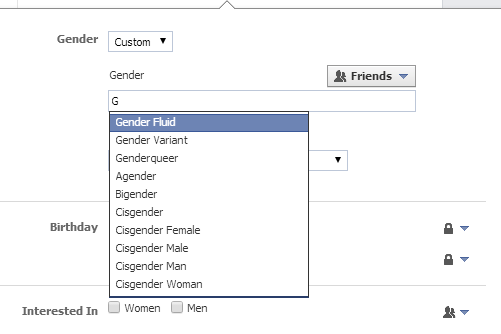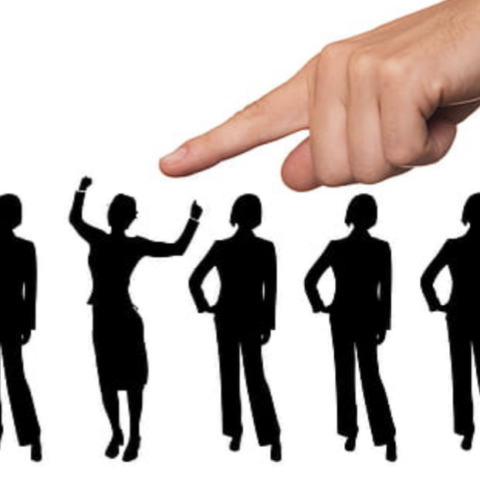By: Shuchi Goyal

Credit: Facebook
For several years, a movement calling for the rejection of the gender binary fueled the growth of the LGBTQ (Lesbian, Gay, Bisexual, Transgender, Queer) communitiy in the undergrounds of Tumblr and Reddit. Society used to dismiss the LGBTQ campaign’s request for society to distinguish between different gender identities, collectively referred to as the “non-binary,” as the radical idea of young malcontents. More recently, however, the number of people in favor of recognizing the non-binary has burgeoned, both in size and in fervor. The heat of the movement made it boil and surge, and on Feb. 13, 2014, it finally spilled out from the depths of Reddit and into the societal mainstream when Facebook added 56 custom gender options for its users to select from for their profile pages.
In a post on its Facebook Diversity page, the social network explained its motivation to add these choices to its customization options: “When you come to Facebook to connect with the people, causes, and organizations you care about, we want you to feel comfortable being your true, authentic self. An important part of this is the expression of gender, especially when it extends beyond the definitions of just ‘male’ or ‘female’.”
Though no set of labels exists for those who categorize themselves under the non-binary, common terms that fall under the umbrella include “transgender” and “genderfluid.” Many terms overlap some, and not all of Facebook’s 56 options are distinct; for example, “genderqueer” and “gender nonconforming” are both broad terms that encapsulate a person who rejects the binary classification without further specification. Similarly, “transgender female” and “trans woman” both refer to a person had male genitalia at birth but identifies as a female. The options also include selections such as “cis male” and “cis female” for people who identify with the gender they were assigned at birth but use the “cis” prefix rather than traditional labels to avoid the implication that they are “normal” or “more correct” than genderqueer people. Although Facebook currently only allows users to choose from the 56 preset options rather than entering their own, presumably to prevent people from abusing the setting, “other” and “neither” are both options. In addition, Facebook now allows users to select their preferred pronoun, between “he,” “she,” and the gender-neutral “they,” so that friends can write on “their” wall rather than “his” wall. Other less common pronouns used by non-binary community, such as “ze” and “hirs” are not yet available.
Backlash to Facebook’s new stance comes from all directions. Jeff Johnston spoke on behalf of the national religious organization Focus on Family, saying that, while Facebook has the freedom to operate as it sees fit, “here’s the bottom line: It’s impossible to deny the biological reality that humanity is divided into two halves – male and female … just saying [that there are an infinite number of genders] doesn’t make it so.” However, this statement ignores the existence of hermaphroditism, a scientifically documented sex condition. Furthermore, many non-binary individuals feel that while biology may define one’s sex, gender relates to one’s comfort zone.
While non-binary individuals technically fall under the “queer” subset of LGBTQ, even members of the LGBTQ community have mixed feelings to the growing number of gender nonconforming labels people are using to identify themselves. Those who worked for the peaceful assimilation of queer people into society during the late 20th century worry that they may once again become ostracized if the non-LGBTQ population begins viewing them as “cumbersome” due to their preference for specific gender labels and pronouns. These usually older members often use forums such as Tumblr with a large LGBTQ presence to distance themselves from the non-binary movement, calling them overzealous, unrealistic, or unappeasable. Yet, what seems impossible and inconvenient today often becomes the norm of tomorrow. For example, one might recall Alan Spear, a passionate gay-rights activist during the 1960s, who described the gay couples petitioning for marriage as “the lunatic fringe” of the movement in 1970—only 34 years before Massachusetts became the first state to legalize gay marriage.
Still other LGBTQ members feel frustrated with Facebook’s latest update, because they view themselves as breaking molds rather than fitting them. They see non-binary labels as barriers and are confused as to why other people would be so keen to confine themselves to specific definitions in the first place. But while some people feel constrained by labels, others find them comforting because labels help give them an identity. Many of my own queer friends, for example, have methodical personalities and struggled emotionally through high school and college, because they were unable to align themselves with a widely accepted gender label. Non-binary categories give them the freedom of deciding their own gender. Being able to associate with their gender publicly on a major communications forum like Facebook, will provide a sense of validation, both for themselves and for a society that would otherwise dismiss them.
When a media giant like Facebook takes a marginalized group like the non-binary individuals into consideration in its operating practices, new opportunities to educate the public about genderqueerness become available. Currently, most people are uninformed about the gender spectrum and, as a result, non-binary children feel removed from society and are more likely to suffer from emotional trauma, according to Time. The same article states that “as many as one in 10 kids display gender non-conformity before age 11.” These children are more likely to suffer from abuse from adults who are unable to understand their struggles and are also more likely to suffer from post-traumatic stress disorder during adulthood. Increased knowledge and more open conversations about the gender non-binary can help parents become better educated on how to accept their children’s gender identities and how to get them sex change treatments if need be.. The last decade has made it clear that the Internet is now the primary force fostering communication, and now Facebook has increased the opportunities for conversation about the gender non-binary.
Facebook’s momentous step forward is only the latest in a series of perhaps less visible but equally important efforts by other public institutions to acknowledge and consider the gender non-binary. Other efforts include the establishment of unisex bathrooms in colleges, including our own, and the appearance of genderqueer characters in popular television shows including “Orange is the New Black.” According to Alan Shultz, the Director of Growth at Facebook, the decision to add options for gender customization was “simple.” “Not allowing people to express something so fundamental is not really cool so we did something,” he said. “Hopefully a more open and connected world will, by extension, make this a more understanding and tolerant world.”

